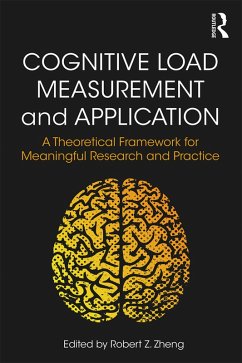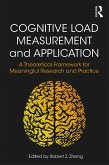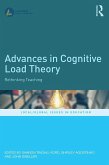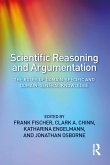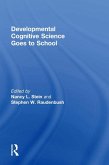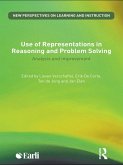Cognitive Load Measurement and Application (eBook, ePUB)
A Theoretical Framework for Meaningful Research and Practice
Redaktion: Zheng, Robert Z.
48,95 €
48,95 €
inkl. MwSt.
Sofort per Download lieferbar

24 °P sammeln
48,95 €
Als Download kaufen

48,95 €
inkl. MwSt.
Sofort per Download lieferbar

24 °P sammeln
Jetzt verschenken
Alle Infos zum eBook verschenken
48,95 €
inkl. MwSt.
Sofort per Download lieferbar
Alle Infos zum eBook verschenken

24 °P sammeln
Cognitive Load Measurement and Application (eBook, ePUB)
A Theoretical Framework for Meaningful Research and Practice
Redaktion: Zheng, Robert Z.
- Format: ePub
- Merkliste
- Auf die Merkliste
- Bewerten Bewerten
- Teilen
- Produkt teilen
- Produkterinnerung
- Produkterinnerung

Bitte loggen Sie sich zunächst in Ihr Kundenkonto ein oder registrieren Sie sich bei
bücher.de, um das eBook-Abo tolino select nutzen zu können.
Hier können Sie sich einloggen
Hier können Sie sich einloggen
Sie sind bereits eingeloggt. Klicken Sie auf 2. tolino select Abo, um fortzufahren.

Bitte loggen Sie sich zunächst in Ihr Kundenkonto ein oder registrieren Sie sich bei bücher.de, um das eBook-Abo tolino select nutzen zu können.
Cognitive Load Measurement and Application provides up-to-date research and theory of the functional role of cognitive load measurement and its application in multimedia and visual learning.
- Geräte: eReader
- mit Kopierschutz
- eBook Hilfe
- Größe: 3MB
Andere Kunden interessierten sich auch für
![Cognitive Load Measurement and Application (eBook, PDF) Cognitive Load Measurement and Application (eBook, PDF)]() Cognitive Load Measurement and Application (eBook, PDF)48,95 €
Cognitive Load Measurement and Application (eBook, PDF)48,95 €![Advances in Cognitive Load Theory (eBook, ePUB) Advances in Cognitive Load Theory (eBook, ePUB)]() Advances in Cognitive Load Theory (eBook, ePUB)38,95 €
Advances in Cognitive Load Theory (eBook, ePUB)38,95 €![Scientific Reasoning and Argumentation (eBook, ePUB) Scientific Reasoning and Argumentation (eBook, ePUB)]() Scientific Reasoning and Argumentation (eBook, ePUB)44,95 €
Scientific Reasoning and Argumentation (eBook, ePUB)44,95 €![More Urban Myths About Learning and Education (eBook, ePUB) More Urban Myths About Learning and Education (eBook, ePUB)]() Pedro De BruyckereMore Urban Myths About Learning and Education (eBook, ePUB)31,95 €
Pedro De BruyckereMore Urban Myths About Learning and Education (eBook, ePUB)31,95 €![Unlocking the Power of Teacher Feedback (eBook, ePUB) Unlocking the Power of Teacher Feedback (eBook, ePUB)]() Unlocking the Power of Teacher Feedback (eBook, ePUB)52,95 €
Unlocking the Power of Teacher Feedback (eBook, ePUB)52,95 €![Developmental Cognitive Science Goes to School (eBook, ePUB) Developmental Cognitive Science Goes to School (eBook, ePUB)]() Developmental Cognitive Science Goes to School (eBook, ePUB)55,95 €
Developmental Cognitive Science Goes to School (eBook, ePUB)55,95 €![Use of Representations in Reasoning and Problem Solving (eBook, ePUB) Use of Representations in Reasoning and Problem Solving (eBook, ePUB)]() Use of Representations in Reasoning and Problem Solving (eBook, ePUB)59,95 €
Use of Representations in Reasoning and Problem Solving (eBook, ePUB)59,95 €-
-
-
Cognitive Load Measurement and Application provides up-to-date research and theory of the functional role of cognitive load measurement and its application in multimedia and visual learning.
Dieser Download kann aus rechtlichen Gründen nur mit Rechnungsadresse in A, B, BG, CY, CZ, D, DK, EW, E, FIN, F, GR, HR, H, IRL, I, LT, L, LR, M, NL, PL, P, R, S, SLO, SK ausgeliefert werden.
Produktdetails
- Produktdetails
- Verlag: Taylor & Francis
- Seitenzahl: 292
- Erscheinungstermin: 22. November 2017
- Englisch
- ISBN-13: 9781315296234
- Artikelnr.: 50925311
- Verlag: Taylor & Francis
- Seitenzahl: 292
- Erscheinungstermin: 22. November 2017
- Englisch
- ISBN-13: 9781315296234
- Artikelnr.: 50925311
- Herstellerkennzeichnung Die Herstellerinformationen sind derzeit nicht verfügbar.
Robert Z. Zheng is Associate Professor of Educational Psychology at the University of Utah, USA.
Part I: Theoretical Perspectives on Cognitive Load Measurement 1. The Role
of Independent Measures of Load In Cognitive Load Theory 2. Subjective
Measures of Cognitive Load: What Can They Reliably Measure? 3. A Critical
Analysis of the Theoretical Construction and Empirical Measurement of
Cognitive Load 4. The Boundary of Different Approaches in Cognitive Load
Measurement: Strengths and Limitations Part II: Methodology in Cognitive
Load Measurement and Application 5. Cognitive Load as a Local
Characteristic of Cognitive Processes: Implications for Measurement
Approaches 6. Secondary Task as a Measure of Cognitive Load 7.Assessing
Working Memory Dynamics with Electroencephalography: Implications for
Research on Cognitive Load 8. The Use of Ocular-Motor Measures in a
Convergent Approach to Studying Cognitive Load 9. Cognitive Load as a
Measure of Capture of the Focus of Attention 10. Multimodal and Data-Driven
Cognitive Load Measurement Part III: Practices in Cognitive Load
Measurement 11. Measuring Cognitive Load in Medical and Health Professions
Simulation Training 12. Exploring the Choices for an Effective Method for
Cognitive Load Measurement in Asynchronous Interactions of E-Learning 13.
Case Studies in Cognitive Load Measurement 14. Connecting Form and
Function: Understanding the Role That Cognitive Load Plays in Students¿
Ability to Construct Representations of Chemical Structure 15.
Neuroergonomic Methods of Assessing Learning
of Independent Measures of Load In Cognitive Load Theory 2. Subjective
Measures of Cognitive Load: What Can They Reliably Measure? 3. A Critical
Analysis of the Theoretical Construction and Empirical Measurement of
Cognitive Load 4. The Boundary of Different Approaches in Cognitive Load
Measurement: Strengths and Limitations Part II: Methodology in Cognitive
Load Measurement and Application 5. Cognitive Load as a Local
Characteristic of Cognitive Processes: Implications for Measurement
Approaches 6. Secondary Task as a Measure of Cognitive Load 7.Assessing
Working Memory Dynamics with Electroencephalography: Implications for
Research on Cognitive Load 8. The Use of Ocular-Motor Measures in a
Convergent Approach to Studying Cognitive Load 9. Cognitive Load as a
Measure of Capture of the Focus of Attention 10. Multimodal and Data-Driven
Cognitive Load Measurement Part III: Practices in Cognitive Load
Measurement 11. Measuring Cognitive Load in Medical and Health Professions
Simulation Training 12. Exploring the Choices for an Effective Method for
Cognitive Load Measurement in Asynchronous Interactions of E-Learning 13.
Case Studies in Cognitive Load Measurement 14. Connecting Form and
Function: Understanding the Role That Cognitive Load Plays in Students¿
Ability to Construct Representations of Chemical Structure 15.
Neuroergonomic Methods of Assessing Learning
Part I: Theoretical Perspectives on Cognitive Load Measurement 1. The Role
of Independent Measures of Load In Cognitive Load Theory 2. Subjective
Measures of Cognitive Load: What Can They Reliably Measure? 3. A Critical
Analysis of the Theoretical Construction and Empirical Measurement of
Cognitive Load 4. The Boundary of Different Approaches in Cognitive Load
Measurement: Strengths and Limitations Part II: Methodology in Cognitive
Load Measurement and Application 5. Cognitive Load as a Local
Characteristic of Cognitive Processes: Implications for Measurement
Approaches 6. Secondary Task as a Measure of Cognitive Load 7.Assessing
Working Memory Dynamics with Electroencephalography: Implications for
Research on Cognitive Load 8. The Use of Ocular-Motor Measures in a
Convergent Approach to Studying Cognitive Load 9. Cognitive Load as a
Measure of Capture of the Focus of Attention 10. Multimodal and Data-Driven
Cognitive Load Measurement Part III: Practices in Cognitive Load
Measurement 11. Measuring Cognitive Load in Medical and Health Professions
Simulation Training 12. Exploring the Choices for an Effective Method for
Cognitive Load Measurement in Asynchronous Interactions of E-Learning 13.
Case Studies in Cognitive Load Measurement 14. Connecting Form and
Function: Understanding the Role That Cognitive Load Plays in Students¿
Ability to Construct Representations of Chemical Structure 15.
Neuroergonomic Methods of Assessing Learning
of Independent Measures of Load In Cognitive Load Theory 2. Subjective
Measures of Cognitive Load: What Can They Reliably Measure? 3. A Critical
Analysis of the Theoretical Construction and Empirical Measurement of
Cognitive Load 4. The Boundary of Different Approaches in Cognitive Load
Measurement: Strengths and Limitations Part II: Methodology in Cognitive
Load Measurement and Application 5. Cognitive Load as a Local
Characteristic of Cognitive Processes: Implications for Measurement
Approaches 6. Secondary Task as a Measure of Cognitive Load 7.Assessing
Working Memory Dynamics with Electroencephalography: Implications for
Research on Cognitive Load 8. The Use of Ocular-Motor Measures in a
Convergent Approach to Studying Cognitive Load 9. Cognitive Load as a
Measure of Capture of the Focus of Attention 10. Multimodal and Data-Driven
Cognitive Load Measurement Part III: Practices in Cognitive Load
Measurement 11. Measuring Cognitive Load in Medical and Health Professions
Simulation Training 12. Exploring the Choices for an Effective Method for
Cognitive Load Measurement in Asynchronous Interactions of E-Learning 13.
Case Studies in Cognitive Load Measurement 14. Connecting Form and
Function: Understanding the Role That Cognitive Load Plays in Students¿
Ability to Construct Representations of Chemical Structure 15.
Neuroergonomic Methods of Assessing Learning
